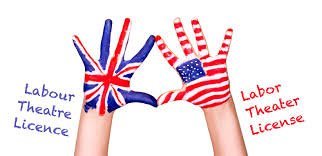
The rendering of speech sound into writing is what that is called ”spelling”. It is a set of conventions that regulate the way of using graphemes to represent a language in its written form. Every nation has its specific pattern and in this article, I am going to show with you the spelling patterns of British and American spelling step by step.
If you’re writing for American readers, for your readers to like your writing and easily understand you, use American spelling patters, for example, ”organization”, the American English word should not be spelled as ”orgainsation” in place of British English.
In fact, in some cases, the British spellings are also acceptable in American English as well.
Note: the original spelling of the word ‘organization‘ is in use in USA. Therefore, ‘organization’ remains the correct form in American countries and all of its former colonies and dependencies, whereas ‘organisation’, with a ‘s’, is the correct one in the UK, England or British countries.
Now, let’s start!!
Similarities between British and American English
When talking about the similarities between British and American English, note that there a handful of them and their differences are more than their similarities.
One of the similarities between British and American English is that the British English practices formal speaking and dictation while the American uses slang and informal English. Beside that, their spelling of the same words even differs from each other.
Some of the British and American words and their spelling difference are analyzed in the table below with their example:
| British Word | American Word |
|---|---|
| -oe-/-ae- (e.g. anaemia, diarrhoea, encyclopaedia) | -e- (e.g. anemia, diarrhea, encyclopedia) |
| -t (e.g. burnt, dreamt, leapt) | -ed (e.g. burned, dreamed, leaped) |
| -ence (e.g. defence, offence, licence) | -ense (defense, offense, license) |
| -ell- (e.g. cancelled, jeweller, marvellous) | -el- (e.g. canceled, jeweler, marvelous) |
| -ise (e.g. appetiser, familiarise, organise) | -ize (e.g. appetizer, familiarize, organize) |
| -l- (e.g. enrol, fulfil, skilful) | -ll- (e.g. enroll, fulfill, skillfull) |
| -ogue (e.g. analogue, monologue, catalogue) | -og (e.g. analog, monolog, catalog)*Note that American English also recognizes words spelled with –ogue |
| -ou (e.g. colour, behaviour, mould) | -o (e.g. color, behavior, mold) |
| -re (e.g. metre, fibre, centre) | -er (e.g. meter, fiber, center) |
| -y- (e.g. tyre) | -i- (e.g. tire) |
Read these also:
- List of all countries in the world and their country code (one by one)
- Top motivational speakers in the world 2022
- Top engineering recruitment agencies in UK (2022)
- List of top 23 biggest churches in Nigeria (everything about them)
- How to transfer airtime from Glo to Glo network
- Airtel YouTube night data bundle bonus and how to use step by step
- Where you can sell your phone instantly
- All chapters in Quran and their meaning in English
- How to deepen your fluency at speaking English language
- Top biggest engineering companies in the world 2022
British and American spelling differences
The most commonly used words and their British and American spelling pattern are now discussed below:
”ogue” ending
”ougue is the suffix that appears at the end of some British words especially in noun form. Their examples are shown in the table below:
Most of the words that end with ”ogue” are assumed to be Noun. Some of their spellings are acceptable in both American and British English. For example, the spelling ”analogue” is acceptable but not very common in American English; ”catalog” has become the US norm, but ”catalogue” is not uncommon; hence, ”dialogue” is still preferred over dialog.
| British | America |
|---|---|
| analogue | analog |
| catalogue | catalog |
| dialogue | dialog |
”ence” ending
Every word that ends with ”ence” is a noun word in British English while their correct one must be ended with ”se” in American word.
| British | Ameria |
|---|---|
| Defence | defense |
| Licence | license |
| Offence | offense |
| Pretence | pretense |
”yse” ending (-ize or -ise)
In British English, a word that ends with ”yse” is a verb, for example, analyse, while it ends with ”yze” in American English.
Every word that ends with -ize or -ise is a verb. In British English, if the word ends with ”-ize” then it must be spelled with ”-ise” in American English.
Some of the verb’s words that end with -ise or ize and their correct British and American spelling patterns are in the table below:
| American | British |
|---|---|
| analyze | analyse |
| apologize | apologise |
| breathalyze | breathalyse |
| organize | organise |
| paralyze | paralyse |
”our” ending
In American English, a word that end with ”or” always end with ”our” in British English, for example, Labour (British) will change to ”Labor” to become correct in American English. Other examples are:
| American | British |
| behavior | behaviour |
| color | colour |
| favorite | favourite |
| harbor | harbour |
| humor | humour |
| labor | labour |
| rumor | rumour |
”–re” ending
Most time, British English words that end in -re often end in -er in American English, for example, ”Centre” in British will change to ”Center” in American English. Other examples are:
| British | American |
|---|---|
| centre | center |
| fibre | fiber |
| litre | liter |
| theatre | theater or theatre |
Single ”L” to double ”LL”
Most time, a word that has double letter ”L” in their British spelling pattern always has single ”L” in their American spelling, for example, traveller (British) will change to traveler in an American English spelling pattern. Some examples are:
| British | America |
|---|---|
| travel | travel |
| travelled | traveled |
| canceling | cancelling |
| fueled | fuelled |
| travelling | traveling |
| traveller | traveler |
Differences between the American and British English in terms of spelling and vocabulary
An American and the British English also have some words that differ from each other. The table below lists some of the everyday objects that have different names, depending on what form of English you are using.
| American | British |
| aging | ageing |
| draft | draught |
| gray | grey |
| pajamas | pyjamas |
| program | programme |
| tire | tyre |
| British | America |
|---|---|
| leukaemia | leukemia |
| manoeuvre | maneuver |
| oestrogen | estrogen |
| paediatric | pediatric |
| diarrhoea | diarrhea |
Conclusion
If you know that this article has helped you know the British and American spelling patterns, please share it with your friends and remember to subscribe to our newsletter for more important updates.
Read these also:
- List of all social media platforms in the world and their founding year
- 12 pillars of Living Faith Church and their organogram
- Nigeria Police Force application or recruitment form 2022 (latest news)
- How to become one of the Yahoo boys and make money in 2022
- How to create WhatsApp link for your number (step by step)
- Electrical safety precautions during rainy season




